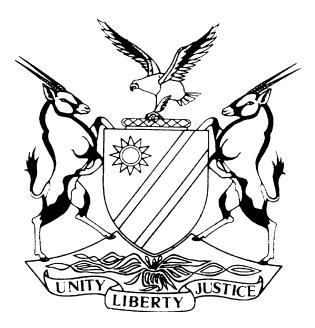4
REPUBLIC OF NAMIBIA

IN THE HIGH COURT OF NAMIBIA NORTHERN LOCAL DIVISION, OSHAKATI
REVIEW JUDGMENT
Case Title: The State v Jonas Kanseb
| Case No: CR 59/2022 Opuwo: TSU-CRM-2153/2021 | |
Division of Court: Northern Local Division | ||
Heard before: Honourable Lady Justice Salionga J et Honourable Mr Justice Kesslau AJ | Delivered on: 19 October 2022 | |
Neutral citation: S v Kanseb (CR 59/2022) [2022] NAHCNLD 115 (19 October 2022) | ||
It is hereby ordered that:
| ||
Reasons for the order: | ||
KESSLAU AJ (SALIONGA J concurring): [1] The matter comes before this court on automatic review in terms of Section 302 of the Criminal Procedure Act 51 of 1977, as amended (the CPA). [2] The accused appeared in the Magistrates Court of Tsumeb on a charge of escaping from lawful custody (common law). On the trial date the charge was altered to one of contravening section 51(1) of the CPA: Escaping before being locked up. The accused plead not guilty and after evidence was presented, the magistrate convicted the accused on the initial charge of escaping from lawful custody (common law). The accused was thereafter sentenced to eighteen months imprisonment. [3] The magistrate was queried as follows: ‘The accused plead to a charge of contravening section 51(1) of the Criminal Procedure Act 51 of 1977: Escaping before being locked up however he was convicted on the common law offence of Escaping from lawful custody. On what basis did the learned magistrate convict the accused on a different charge than the one he plead to?’ [4] The magistrate in his reply stated that the evidence supported the common law offense of escaping and requested the confirmation of his already substituted conviction. [5] Section 270 of the CPA, which deals with competent verdicts in offences not specifically specified, states as follows: ‘If the evidence on a charge for any offence not referred to in the preceding sections of this Chapter does not prove the commission of the offence so charged but proves the commission of an offence which by reason of the essential elements of that offence is included in the offence so charged, the accused may be found guilty of the offence so proved’. [6] Discussing the provisions of section 86 and 88 of the CPA, Liebenberg J in S v Nghixulifwa1 stated that: ‘Substance is the important consideration as even an essential element of the charge can be corrected during the trial by way of evidence or on application, as provided for in sections 86 and 88 of the CPA. The effect thereof is however only to correct a defective charge and not to substitute it with another offence. Neither section 86 or 88 of the CPA allows for the substitution of a charge, least between statutory and common law offences. These provisions only provide for the correcting or curing of a defect of an existing charge and not its substitution.’ [7] In S v Endjala2, the reviewing court, faced with similar circumstances, followed the reasoning in S v Matsuis.3 It was determined that the substitution between the two charges are not possible in that it requires one of the essential elements of the offence to be altered. The common law offense of escaping contains the element of ‘escaping from a prison or other place of lawful detention’ whilst the escaping in terms of section 51 (1) of the CPA in fact requires the opposite being escaping ‘before lodged in a prison or police cell’.4 Thus even though both the offences deal with escaping, they contain distinctive elements which may require additional evidence to be led in order to prove each offence. [8] The conviction on the common law offense of escaping cannot be confirmed as it was not a competent verdict to the offense charged. Substitution on review is only possible where the essential elements are not altered by the substituted offence or where a wrong label was attached to the charge5. Furthermore there is possible prejudice to the accused as he did not plead guilty to the offense and might have conducted his defense differently if charged with the alternative. The magistrate referred to the matters of S v Cloete6 and S v Dambudzo7 in support of his request for a correction. Both these matters however discussed substitution in cases were wrong ‘labels’ were attached to the charges and does not find application here. [9] In conclusion the conviction cannot be confirmed and furthermore this reviewing court cannot substitute a contravention under section 51 of the CPA with the charge of common law escaping. It follows that the sentence cannot stand. It is for the office of the Prosecutor General to decide if the accused should be charged afresh. [10] In the result the following order is made:
| ||
Judge(s) signature | Comments: | |
KESSLAU AJ: | None | |
SALIONGA J: | None | |
1 S v Nghixulifwa (CC 02/2014) [2018] NAHCMD 326 (17 October 2018) para 11.
2 S v Endjala (CR 71/2020) [2020] NAHCMD 432 (23 September 2020).
3 S v Matsuis 1993 NR 234 (HC).
4 Snyman CR. Criminal Law, 7th Edition, 302.
5 S v Endjala (Supra); S v Babiep 1999 NR 170 (HC).
6 S v Cloete (CR 41/2020) [2020] NAHCMD 240 (22 June 2020).
7 S v Dambudzo (CR 40/2021) [2021] NAHCMD 240 (18 May 2021).
Cited documents 5
Judgment 4
- S v Cloete (8) (Review Judgment) (CR 41 of 2020) [2020] NAHCMD 240 (22 June 2020)
- S v Dambudzo (CRIMINAL 40 of 2021) [2021] NAHCMD 240 (18 May 2021)
- S v Endjala [2020] NAHCMD 432 (23 September 2020)
- S v Nghixulifwa (CC 2 of 2014) [2018] NAHCMD 326 (17 October 2018)